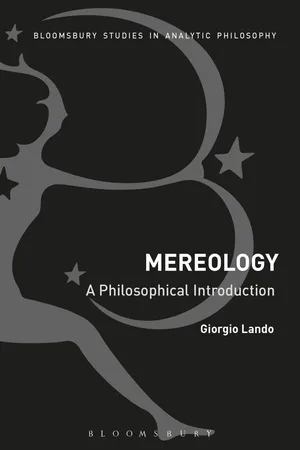
- 240 pages
- English
- PDF
- Available on iOS & Android
Mereology: A Philosophical Introduction
About this book
Parthood and composition are everywhere. The leg of a table is part of the table, the word "Christmas" is part of the sentence "I wish you a merry Christmas", the 13th century is part of the Middle Ages. The Netherlands, Belgium, and Luxembourg compose Benelux, the body of a deer is composed of a huge number of cells, the Middle Ages are composed of the Early Middle Ages, High Middle Ages, and Late Middle Ages. Is there really a general theory covering every instance of parthood and composition? Is classical mereology this general theory? Are its seemingly counter-intuitive features serious defects? Mereology: A Philosophical Introduction addresses the multifaceted and lively philosophical debates surrounding these questions, and defends the idea that classical mereology is indeed the general and exhaustive theory of parthood and composition in the domain of concrete entities. Several examples of parthood and composition, involving entities of different kinds, are scrutinised in depth. Incidentally, mereology is shown to interact in a surprising way with metaontology. Presenting a well-organized and comprehensive discussion of parthood and related notions, Mereology: A Philosophical Introduction contributes to a better understanding of a subject central to contemporary metaphysics.
Frequently asked questions
- Essential is ideal for learners and professionals who enjoy exploring a wide range of subjects. Access the Essential Library with 800,000+ trusted titles and best-sellers across business, personal growth, and the humanities. Includes unlimited reading time and Standard Read Aloud voice.
- Complete: Perfect for advanced learners and researchers needing full, unrestricted access. Unlock 1.4M+ books across hundreds of subjects, including academic and specialized titles. The Complete Plan also includes advanced features like Premium Read Aloud and Research Assistant.
Please note we cannot support devices running on iOS 13 and Android 7 or earlier. Learn more about using the app.
Information
Table of contents
- Cover
- Half-title
- Title
- Copyright
- Contents
- Acknowledgments
- Introduction: What is Mereology?
- Part One: The Methodology of Mereological Monism
- Part Two: Extensionalism
- Part Three: Unrestricted Composition
- Appendix: Mereological Monism, without Composition as Identity
- Notes
- References
- Index